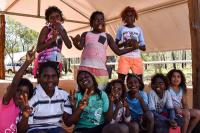An Aboriginal outstation in remote Arnhem Land [Northern Territory] is preparing to open its own school that blends Indigenous and western teaching. The school at Kabulwarnamyo, located on the west Arnhem Land plateau about 650 kilometres south-east of Darwin, will launch with 10 children early next month. It's a move that rejects a federal government push to send children from outstations to larger regional communities and towns.
Dean Yibarbuk is as a senior ranger and researcher at Kabulwarnamyo.
He said the worry of living away from their children was what lead parents at the outstation to begin talking about setting up their own school.
"The government was taking away remote area schools and they wanted all the kids to go and live in the growth areas and be educated there," Mr Yibarbuk said.
"Having a child living in a growth area while parents are living out in the remote outstations, it's so much worry.
"We are also a bit frightened for our kids because of these influences (that) are coming real fast and big and rapid, such as alcohol, such as drugs."
A lot of the people who live at the outstation work for Warddeken Land Management, a group set up to support ranger work on country.
The outstation's focus on ranger work was the brainchild of traditional owner Bardayal 'Lofty' Nadjamerrek, a prominent Indigenous elder, artist and environmentalist.
The group manages the Warddeken Indigenous Protected Area, which covers 1.4 million hectares of pristine, untouched savannah and woodlands wilderness on the plateau.
Known more commonly to the locals as the 'stone country', the region is dotted with gorges, waterfalls and natural springs.
Bjorn Everts works for the Karrkad-Kanjdji Trust, an organisation set up by traditional owners to secure long-term funding for the Warddeken and neighbouring Djelk Indigenous Protected Areas.
The trust has been working to set up the school.
"It was a very clear idea from the community that a school would solve many problems," Mr Everts said.
"It would allow the kids to have an education on country but it would also allow the rangers that work at Kabulwarnamyo to stay in their meaningful employment."
Plans to set up the school ramped up a year and a half ago.
A steering committee was established and the group decided they wanted the school to offer a unique blend of traditional and western education.
"Traditional education hasn't been really focused with the government education before," Mr Yibarbuk said.
"We know our children are losing lots of understanding — family relationships, land ownership, a lot of kids don't know their country very well.
"We want to try to build that traditional education so that children are growing up to have that better understanding of what's out there.
"For western education, we want to see our children get a proper education and to have a pathway to university."
A non-Indigenous teacher has been employed to live and work at the outstation but local elders will play a critical role.
"The children will actually be enrolled through Katherine School of the Air, which means that they are technically enrolled in a government school system," Mr Everts said.
"We will adhere to the Australian curriculum but we will augment that curriculum with a lot of cultural activities.
"A few key members of the community have been involved in delivering culture camps for over 10 years now and they've got a very clear idea of how to deliver cultural knowledge in a way that engages the children."
Building a new approach to education
The custom-built classroom is not your usual building with four walls.
It's a shade structure with wooden decking that is completely open to the surrounding environment.
"We've got a very open area where kids can have a breeze and enjoy what's outside," Mr Yibarbuk said.
"In this way the children have freedom, they can look around."
About $300,000 has been budgeted to build and set up the school in the first year.
Warddeken Land Management committed a third of the funds through money it earned through early season savannah burning to reduce wildfires.
"Based on baseline data that they've collected they can demonstrate that they reduce the amount of carbon going into the atmosphere and that gets sold through a carbon emissions trading scheme," Mr Everts said.
"The rangers themselves are donating a substantial portion of their salary to starting up this school and that itself is a wonderful story — there's a clear desire to start a school in the community."
Mr Yibarbuk agrees.
"We want to show the government how much initiative we have in having our own school," he said.
"We want to put our own money to show them that we have the capacity as well to make our own pathways, setting up the things for our children in the future," he said.
He hopes other communities follow in their footsteps.
"We want to see people saying 'okay Kabulwarnamyo got their own school, we can do the same'," Mr Yibarbuk said.
"Across northern Australia I believe we have common issues, common problems and common understanding and it needs to come from the people themselves."
Federal Indigenous Affairs Minister Nigel Scullion was contacted to comment on the new school, but he was unavailable.
The Nawarddeken Academy will open early next month.

